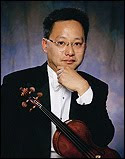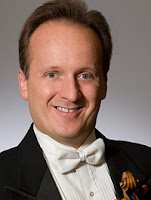By Greg Stepanich
Sergei Prokofiev didn’t write a great deal of chamber music, but his two string quartets, two violin sonatas (one originally for flute) and piano quintet are marvelous works, and worthy of the repertory status that only the violin sonatas currently appear to have.
The same goes for the Sonata for Two Violins (in C, Op. 56), written in 1932 for a French chamber music series in Paris. It’s a fascinating, absorbing piece, and Tuesday night at Persson Hall it received a standout performance from two members of the Atlanta Symphony Orchestra.
Jun-Ching Lin (at right) and Jay Christy, who are part of the faculty for this summer’s Stringendo School for Strings at Palm Beach Atlantic University, were right in tune with the Prokofiev, and not just in the numerous bits of tricky intonation at the ends of phrases, in which the two players have to end up on the same pitch. They were right in synch with the spirit of this piece, which covers a good deal of dramatic and emotional ground, and does so in the Russian composer’s most pungent harmonic idiom.
Both men are fine players who demonstrated complete command of their instruments, and worked well together, trading motifs and themes seamlessly. Especially noteworthy were the second movement, which opened with a savage, but precise ferocity in which the little minor-key melodic fragment was hammered out with impressive force.
The slow third movement was played with wonderful, sorrowful contrast, lullaby-like and tender, and here, too, the primary melodic materials were clearly marked out. It’s worth noting that there are frequent ostinato patterns used as accompaniments in this sonata, and both men took turns shifting from lead to support and back again with expert fluidity.
The outer movements were just as striking, the first for its shape-shifting harmonic structure and its treacherous unison high-note summits, and the finale for its crisp, martial vigor. This was a splendid performance of this fine piece, and a pleasure to hear.
Lin and Christy (at right) were joined by violists Renata Guitart and David Pedraza, an d cellists Jonah Kim and Hector Ochoa, for the early, ravishing String Sextet No. 1 (in B-flat, Op. 18) of Brahms, composed in 1859. This is one of Brahms’ finest youthful pieces, and it’s pretty hard to resist; this performance won fervent applause, and in general it was well-deserved.
d cellists Jonah Kim and Hector Ochoa, for the early, ravishing String Sextet No. 1 (in B-flat, Op. 18) of Brahms, composed in 1859. This is one of Brahms’ finest youthful pieces, and it’s pretty hard to resist; this performance won fervent applause, and in general it was well-deserved.
Much of the more extroverted writing in this piece features the two violins and the first cello, with the second used more like a bass. Kim, the first cellist, a Lynn University student who already has an international career, was central to the success of this performance, playing his solo passages with a compelling, intense accuracy. The six players offered a pleasing blend as an ensemble, and clearly communicated with each other to make tempo and dynamic changes smooth.
The performance as a whole also had a feeling of bigness and force, though in the first movement, the little four-note motif that appears throughout the work was a bit too heavy on its first appearance, and there were some questionable intonations across the ensemble in the opening minutes as this particular ship of state righted itself and found its sea legs.
The second movement, a magnificent theme-and-variations that has a strong mid-18th-century flavor, was played with huge, aggressive attacks on the chord changes, which helped evoke the antiquarian sound of which Brahms was so fond. Kim’s solo first variation was right on target, and while the violas had some difficulty with exact tuning in the folk-style major-key variation at the end, it still came across with great effectiveness.
Lin showed his skill as a leader in setting a delightfully appropriate lightness and relaxed tempo for opening of the third-movement scherzo, and of crafting the speedier tempo for the trio. The finale had the same kind of heavy stresses as the first movement, and when it got to the fugue-like development section, with its accented three-note anchors, it was just short of over the top. But it was tempestuous and exciting, and a fine conclusion to an excellent reading of this sextet, and of the concert.
Tuesday’s program opened with the popular Rondo from Paganini’s Violin Concerto No. 2 (in B minor, Op. 7, La Campanella), as arranged for viola by William Primrose. Pedraza was the soloist, accompanied by pianist Liera Antropova. Unfortunately, this piece was not ready for public performance, though it had glimmers of what it could be when Pedraza gets it under his fingers; Antropova did yeoman service in keeping the music on track.
The Stringendo series of faculty concerts closes next Tuesday with music of Luigi Boccherini: the String Quintet in C (La musica notturna delle strade di Madrid, G. 324), played by violinists Patrick Clifford and Belen Clifford, violist Renata Guitart, and cellists Claudio Jaffé and Jonah Kim. Kim solos in the Fantaisiestücke, Op. 73, of Schumann, accompanied by Liera Antropova, followed by the Schubert Piano Trio in B-flat, Op. 99, with Clifford, Jaffé and Antropova. The concert begins at 7 p.m. Tuesday in Persson Recital Hall on the campus of Palm Beach Atlantic University in West Palm Beach. Tickets are $15; call 803-2970 or visit www.pba.edu.
